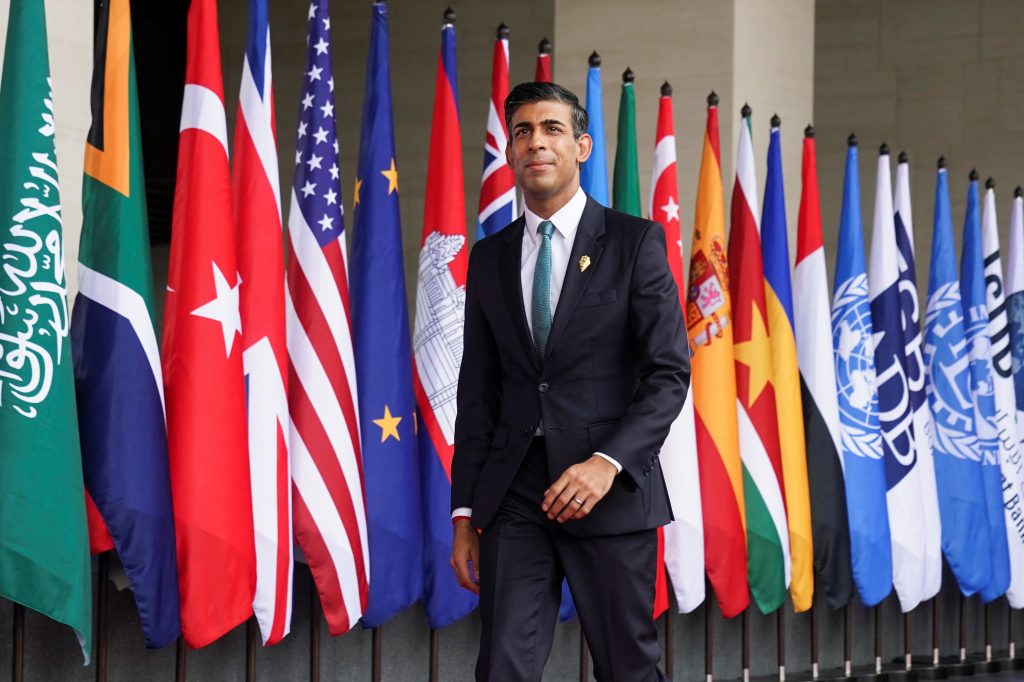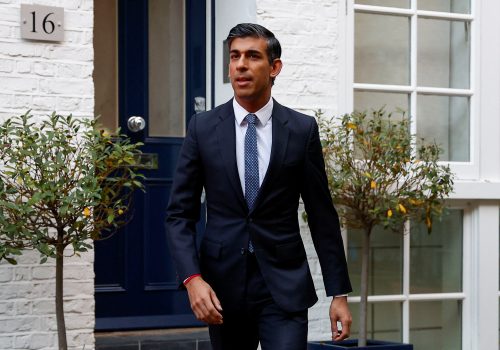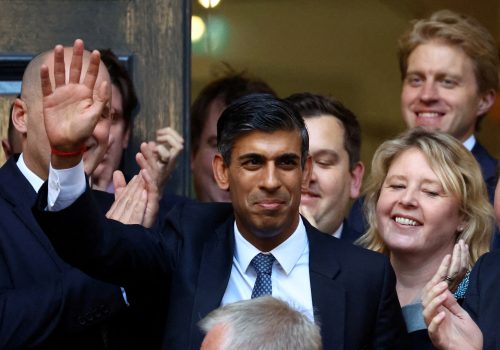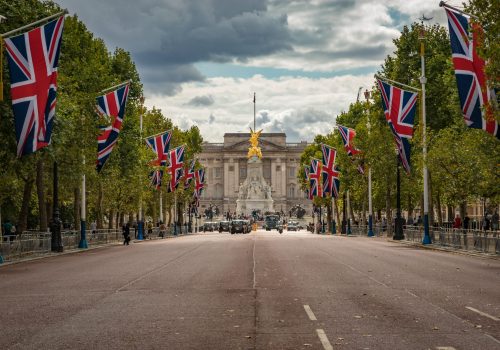UK Prime Minister Rishi Sunak says he wants an evolution for Britain’s role in the world. But two months into his term, Sunak’s approach appears to be caution, offering change around the edges of Britain’s foreign policy and showing himself to be a technocratic and careful operator abroad. Continuity is not a negative by itself. But with Russia’s upending of Europe’s security and the geopolitical shift toward the Indo-Pacific, Sunak needs to offer more if Britain is to be a partner of first resort.
With neither the background nor the experience of a statesman, Sunak’s foreign-policy credentials were the biggest question mark on his résumé. Taking office amid a year of chaos in London—which saw Liz Truss’s historically brief premiership and the end of Boris Johnson’s unruly tenure— Sunak’s focus was primarily domestic. His job as prime minister, as he saw it on day one, was to steady the ship at home, starting with the immediate undoing of the disastrous mini budget that collapsed the British pound and doomed Truss’s government.
Despite that domestic focus, Sunak was immediately confronted with matters of state. After less than a month on the job, Sunak had already held bilateral meetings at the United Nations Climate Change Conference of the Parties (COP27) in Egypt and visited Ukrainian President Volodymyr Zelenskyy in Kyiv. He had also represented Britain at major convenings in Indonesia—both at the Group of Twenty (G20) Summit and at the emergency Group of Seven (G7) gathering after a missile, launched by Ukraine in defense against a Russian air barrage, killed two Polish citizens. His international visits aside, Sunak faced comments about his lack of larger vision, which he sought to quiet with his first foreign-policy speech in late November, where he promised: “We will do things differently. We will evolve.”
Yet so far, Sunak has leaned on continuity and caution with little in the way of evolution.
Sunak has opted for caution and continuity with his predecessors across four areas—Ukraine, Europe, the Indo-Pacific, and China. For Britain’s allies, stability will be welcome following almost a year of political theater and chaos. But the maintenance of existing policy will have its limits, especially as officials in Washington ask for more from a prime minister who has less to give.
On Ukraine, Sunak has continued London’s support to Kyiv but has raised alarms about his attitudes toward the aid. Sunak has largely mirrored the popular approach championed by Johnson, who ingratiated himself with the people of Ukraine by lending fervent support to the country. Sunak has promised to “stand with Ukraine for as long as it takes,” most recently promising to supply Kyiv with more artillery ammunition. This pledge follows Sunak’s early visit to Ukraine, which resembled the trip made by Johnson and the one planned by Truss before her resignation. At the same time, a leak from Whitehall that Sunak called for an audit of UK support for Ukraine only builds on his reputation as a leader guided by caution and with a proclivity for a simplistic cost-benefit approach to foreign policy.
Beyond Ukraine, Sunak has opted for cool but productive relations with the rest of Europe. His push for a cordial relationship is a break from Johnson’s bitter dealings with Brussels but still takes a cautious approach, allowing for cooperation where mutual interests align without a full embrace of the continent. Sunak’s biggest success with Europe is rapprochement with French President Emmanuel Macron and the UK-France deal on stopping illegal migrants from making the dangerous journey across the English Channel. He has endorsed the United Kingdom’s involvement in the European Political Community and voiced support for Britain’s participation in the PESCO project on European military mobility, but both initiatives reflect continuity. They came about before his time as prime minister.
Like in Europe, Sunak has so far continued existing projects in the Indo-Pacific rather than starting new evolutionary initiatives. For proof of his government’s focus on the region, Sunak has leaned on two relics of the Johnson era: the AUKUS pact between the United Kingdom, United States, and Australia, and the 2021 Integrated Review, which identified the tilt toward the Indo-Pacific as a strategic objective for “Global Britain.” Sunak has pledged to lay out his vision in more detail with an update to the Integrated Review in 2023, but any revision of the strategy document will likely be a touching up around the periphery, not an overhaul of priorities.
Finally, Sunak’s biggest push for policy continuity is on China. The prime minister promised an end of the United Kingdom’s “golden era” with China and dismissed “naïve” former policies. Yet action on China still mirrors that of previous governments. Sunak has pointed to a ban on Chinese-owned Huawei from Britain’s 5G infrastructure as an example of tough policy, but it was a policy started in 2020 and has more recently faced delays in implementation. In his November speech, he cited the government’s decision to block the sale of Britain’s largest semiconductor plant to a Chinese-owned firm, but that decision really marked the end of a sixteen-month saga spanning both the Johnson and Truss governments.
Sunak has also already tempered expectations on China. Stressing that Britain “cannot simply ignore China’s significance in world affairs,” his comments fit with a quiet policy of complacency seen under previous governments, which positions Britain to be less active against China than some in Washington or Sunak’s own Conservative Party may hope.
Approaching the end of a chaotic year, Sunak’s actions reveal the limits of a prime minister whose reputation as a cautious operator carries over into his foreign policy. This caution translates into the embrace of the status quo that Sunak promised to adapt.
Continuation is not necessarily a disqualifier of sound foreign policy. Britain has earned praise for its support to Ukraine and early turn to the Indo-Pacific, and smart foreign-policy decisions will help cement Sunak as a serious leader on the world stage. However, as Russia’s war in Ukraine is poised to continue and the West’s focus continues to move toward the Indo-Pacific and China, Sunak’s cautious approach will have its limits. Officials in Washington will want an active partner who will step up on support to Ukraine and embrace confrontation with China, for example on support for Taiwan and for decoupling of trade dependences.
As a European nuclear power with significant military might and established relations in the Indo-Pacific, Britain is an important player on the world stage. Sunak will inevitably have his foreign-policy decisions measured against Truss and Johnson, especially as a young and inexperienced statesman. He must deliver on his own promises to evolve Britain’s foreign policy by doing away with caution and embrace more than just continuity on the world stage.
James Batchik is an assistant director at the Atlantic Council’s Europe Center.
Further reading
Mon, Oct 24, 2022
Experts react: Rishi Sunak makes history as newest UK prime minister. Can he calm a country in chaos?
Experts react By
Can Sunak calm the markets and the country? What should the world expect from Great Britain’s new leader? Our experts are on the case.
Mon, Oct 24, 2022
What to expect from Rishi Sunak’s Britain
Fast Thinking By
Can Sunak steady the markets, the country, and the Conservative Party? How will minority communities in Britain view a history-making prime minister of Indian descent?
Fri, Oct 8, 2021
Global Britain: An American review
Issue Brief By
What is happening to Britain in the world? Since 2016, when Brexit began with the United Kingdom’s shock “leave” vote to quit the European Union, the conversation has become almost impossible to have without entering into a fierce and polemical debate surrounding the country’s departure.
Image: British Prime Minister Rishi Sunak arrives for the G20 leaders' summit in Nusa Dua, Bali, Indonesia, November 15, 2022. REUTERS/Kevin Lamarque/Pool



